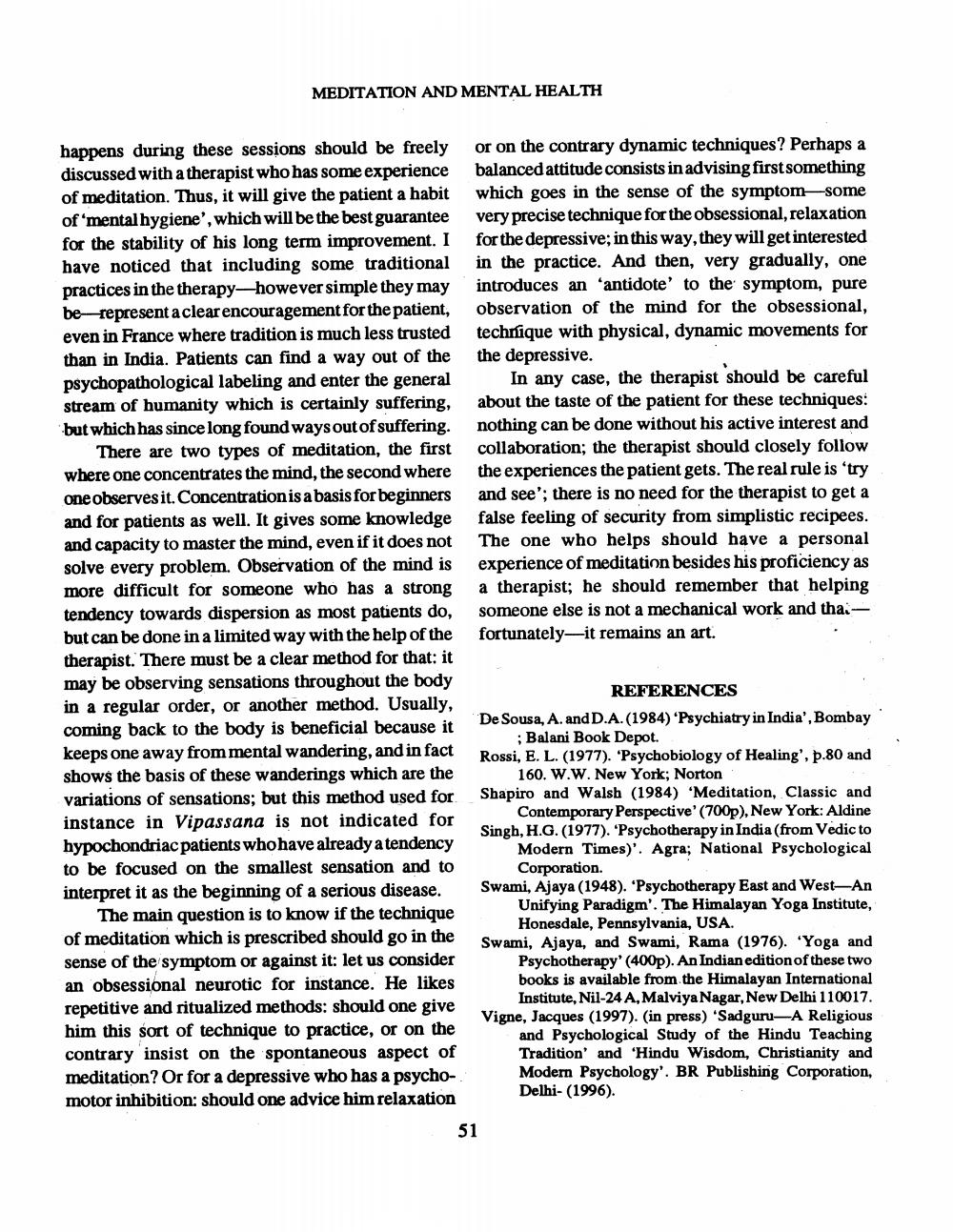________________ MEDITATION AND MENTAL HEALTH happens during these sessions should be freely discussed with a therapist who has some experience of meditation. Thus, it will give the patient a habit of 'mental hygiene', which will be the best guarantee for the stability of his long term improvement. I have noticed that including some traditional practices in the therapy-however simple they may be represent a clear encouragement for the patient, even in France where tradition is much less trusted than in India. Patients can find a way out of the psychopathological labeling and enter the general stream of humanity which is certainly suffering but which has since long found ways out of suffering. There are two types of meditation, the first where one concentrates the mind, the second where one observes it. Concentration is a basis for beginners and for patients as well. It gives some knowledge and capacity to master the mind, even if it does not solve every problem. Observation of the mind is more difficult for someone who has a strong tendency towards dispersion as most patients do, but can be done in a limited way with the help of the therapist. There must be a clear method for that: it may be observing sensations throughout the body in a regular order, or another method. Usually, coming back to the body is beneficial because it keeps one away from mental wandering, and in fact shows the basis of these wanderings which are the variations of sensations; but this method used for instance in Vipassana is not indicated for hypochondriac patients who have already a tendency to be focused on the smallest sensation and to interpret it as the beginning of a serious disease. The main question is to know if the technique of meditation which is prescribed should go in the sense of the symptom or against it: let us consider an obsessional neurotic for instance. He likes repetitive and ritualized methods: should one give him this sort of technique to practice, or on the contrary insist on the spontaneous aspect of meditation? Or for a depressive who has a psychomotor inhibition: should one advice him relaxation or on the contrary dynamic techniques? Perhaps a balanced attitude consists in advising first something which goes in the sense of the symptom some very precise technique for the obsessional, relaxation for the depressive; in this way, they will get interested in the practice. And then, very gradually, one introduces an 'antidote' to the symptom, pure observation of the mind for the obsessional, technique with physical, dynamic movements for the depressive. In any case, the therapist should be careful about the taste of the patient for these techniques: nothing can be done without his active interest and collaboration; the therapist should closely follow the experiences the patient gets. The real rule is 'try and see'; there is no need for the therapist to get a false feeling of security from simplistic recipees. The one who helps should have a personal experience of meditation besides his proficiency as a therapist; he should remember that helping someone else is not a mechanical work and thai - fortunately--it remains an art. REFERENCES De Sousa, A. and D.A.(1984) 'Psychiatry in India', Bombay ; Balani Book Depot. Rossi, E. L. (1977). 'Psychobiology of Healing', p.80 and Ros 160. W.W. New York; Norton Shapiro and Walsh (1984) 'Meditation, Classic and Contemporary Perspective' (700), New York: Aldine Singh, H.G. (1977). 'Psychotherapy in India (from Vedic to Modern Times)'. Agra; National Psychological Corporation. Swami, Ajaya (1948). "Psychotherapy East and West--An Unifying Paradigm'. The Himalayan Yoga Institute, Honesdale, Pennsylvania, USA. Swami, Ajaya, and Swami, Rama (1976). "Yoga and Psychotherapy' (400p). An Indian edition of these two books is available from the Himalayan International Institute, Nil-24 A, Malviya Nagar, New Delhi 110017. Vigne, Jacques (1997). (in press) 'Sadguru-A Religious and Psychological Study of the Hindu Teaching Tradition' and 'Hindu Wisdom, Christianity and Modern Psychology'. BR Publishing Corporation, Delhi- (1996). 51




